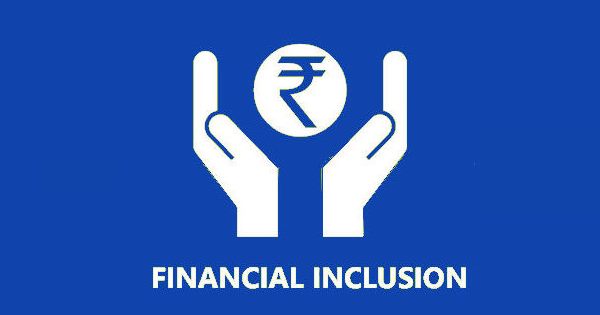E-Financial
Experts Identify Ways to Extend the Boundaries of Financial Inclusion Strategy

Experts at the Inclusive Finance Nigeria Conference and Awards [IFINCA] have identified the various ways the Central Bank of Nigeria [CBN] can extend the boundaries of financial inclusion strategy in order to realise its goal.

In a circular, the CBN had said it is not meeting any of the financial inclusion target agreed and contained in the 2012 Financial Inclusion Strategy.
IFINCA is a national policy platform on financial inclusion setup with the objective of enabling cross-pollination of best practices and breakthroughs, specifically to influence Nigeria’s financial inclusion strategy and campaign.
According to the CBN, Nigeria achieved 60.3 per cent in 2012. It declined to 58.4 per cent in 2016 against a target of 69.5 per cent, which translated to financial exclusion of about 41.6 per cent.
However, to ensure the CBN achieve its policy thrust, the analysts who spoke at IFINCA said it’s important to ensure that the under-banked and the unbanked are offered inclusive financial services.
In her keynote address at the event, Ronke Kuye, managing director/CEO of Shared Agent Network Expansion Facility [SANEF], identified the following major service areas that are required in order to deepen financial inclusion in the country.
These are the provision of sustainable job opportunities, stronger bank operation, reduction of inequality, creation of empowerment programmes, reduction of formal financial services and a boost in financial security and operation.
While addressing the theme of the event, which asked, is it time to reinvent and push the boundaries; she noted that for the financially excluded to be brought into the financial net, certain initiatives must be adopted.
Kuye informed that the CBN is making an effort to ensure that financial inclusion target is met by initiating the mobile money agents, SANEF and agency banking services. Through the initiatives, SANEF had rolled out 156,000 agents. To meet its target of 250,000 agents, SANEF is required to capture another 94,000 agents before the end of 2019.
The impediments that are slowing down the wheels of financial inclusion in Nigeria, according to her, include high cost of banking transaction, lack of attractive financial products, inadequate financial literacy programmes, poor customer service, inadequate infrastructure and cumbersome banking process.
To overcome these impediments, she explained that the industry stakeholders must close ranks and work together and create sustainable synergies that will promote financial inclusion.
“All the regulators and central service providers, agency banking such as SANEF and other developmental organization, super agents, fintech and telcos and the microfinance banks, state governments and the security agencies must work together in order to bring the Nigerians that are excluded into the financial ecosystem”, she said.
Mrs Titilola Shogaolu, Divisional CEO of Interswitch Financial Inclusion Service, while proffering on what’s still missing in financial inclusion in Nigeria, she said “there’s an existing gap despite various initiatives that have been deployed by relevant stakeholders”.
She therefore identified lack of identity card, which is needed for bank accounts opening as a barrier to digital financial inclusion. She said the following must be implemented to achieve financial inclusion in Nigeria.
These are maximum security, alignment and collaboration, provision of simple financial service, attractive benefits, building trust, financial literacy and creation of the multi-lingual channel.
Speaking on the yardsticks for measuring financial inclusion, Oluwadare Owolabi, managing director/CEO of Xpress Payments Solutions, said the results and goals of financial inclusion could only be measured through the provision of access to affordable financial service that meet people’s needs, secured financial services, the establishment of proper financial institutions that cater to the needs of the poor and the use of agency banking.
He identified “access indicator” – the number of bank branches, PoS devices, number of bank accounts and remittances, banking agents, loans and savings with the banks, level of literacy among others – as an important means to deepen financial inclusion and bring more Nigerians into the formal financial service.
Olaoluwa Awojoodu, managing director/CEO of E-Settlement and of Paycentre, in his presentation on the viability of agent banking networks stressed that the challenges facing financial inclusion must be pulled down before the CBN achieve its goals.
He listed these challenges as the unavailability of affordable banking services, threesome documentation and onboarding process, low literary level, non-presence of banks in a rural area and “negative view of banks as being overly complex”.
He said his team carried out a survey and realized that many local areas lack access to financial services, adding that 80 per cent of the banks in Nigeria are sited in Lagos while other states are suffering. “We need to tackle these barriers in order to promote financial inclusion for suitable economic development”.
Explaining how the banks can apply themselves to extend the boundaries of financial inclusion while speaking during the Future of Financial Inclusion panel sitting, the Managing Director and CEO of Precise Financial Systems, Dr Yele Okeremi noted that Nigerians are not interested in the banks but in banking services; as such, the banks must “reengineer their minds by deploying technological innovations that will make them lead the space”, he emphasized.
In similar vein, Nnaemeka Nwachukwu, Head, Executive Support and Corporate Strategy of Grooming Centre, delved into how technology is disrupting the financial inclusion space and redefining all sectors of the economy.
He said Grooming has completed the bank processor information to boost financial inclusion and that the motive is to work optimally with technology and address challenges facing financial inclusion.
“There are technological infrastructure deficiencies in the rural part of the country which we are working towards addressing by partnering with major stakeholders in the industry. We are also training some Nigerians on how to use some technology especially software to access data. But the industry needs to do more”, he noted.
E-Financial
Nigerian Banks End Years of Embargo, Resume Intl Transactions on Naira Cards

Nigerian banks have resumed international transactions on naira-denominated debit cards, marking a significant shift in banking operations for customers who rely on foreign payments.

This is coming nearly three years of suspension.
United Bank for Africa (UBA) and Wema Bank, in separate communications to their customers, announced the restoration of international payment services on their naira cards.
In a notice to its customers, UBA said the reactivation of international transactions on its premium naira cards aligns with its commitment to delivering improved and seamless banking experiences.
“We are pleased to inform you that all UBA Premium Naira Cards, including Gold, Platinum, and World variants, are now enabled for international transactions,” the bank stated.
“This means you can now use your Premium Naira Card for global payments — including online shopping, POS, and ATM transactions — with ease and flexibility. If you haven’t used your card recently, now is a great time to rediscover the convenience and prestige that comes with being a UBA premium cardholder.”
Similarly, Wema Bank announced that its customers can now make dollar payments on international platforms using their naira Mastercards.
“Your Wema Naira Mastercard just went global!” the bank said. “Now you can pay in dollars on all your favourite international platforms — Amazon, eBay, AliExpress, Netflix, Spotify, YouTube.”
The development marks a major relief for Nigerian customers who have had to rely on dollar cards or alternative payment methods since most banks suspended international usage of naira cards in 2021 due to foreign exchange scarcity.
E-Financial
Flutterwave Secures 20 more US Money Transmitter Licences

Flutterwave, Africa’s leading payments technology company, today announced the relaunch of its flagship remittance solution, Send App, across U.S. states following its newly acquired Money Transmitter Licences (MTLs).

This comes after Flutterwave secured 20 additional MTLs in the U.S., adding to the 14 licenses the brand has held since 2023.
Altogether, this achievement raises Flutterwave’s total number of direct licenses to 34, allowing the company to operate across many U.S. states and territories without partners or intermediaries.
Users in the U.S. can now send money to Nigeria, Ghana and Egypt, unlocking new remittance corridors that were previously unavailable.
Alongside this expansion, the onboarding process has been streamlined with a quick ID check, making it faster and easier for new users to get started.
Additional improvements include optimised payment support for US-issued Visa and Discover cards, enhanced security measures to safeguard transactions and maintain compliance, and improved in-app flows for a simpler, more efficient sending experience.
This return also highlights Flutterwave’s commitment to delivering a seamless, secure, and regulatory-compliant user experience for all Send App customers in the U.S. Users can now send money from DC, Georgia, Maryland, North Carolina, Michigan, South Carolina, Tennessee.
Other U.S. states and territories where Send App by Flutterwave supports outward remittances include Alaska, Arizona, Arkansas, Delaware, Idaho, Illinois, Indiana, Iowa, Louisiana, Maine, Minnesota, Mississippi, and Missouri, Nebraska, New Hampshire, New Mexico, North Dakota, Oklahoma, Oregon, Puerto Rico, Rhode Island, South Dakota, Utah, Washington, West Virginia, Wisconsin, and Wyoming.
Commenting on the relaunch, Olugbenga “GB” Agboola, Flutterwave Founder and CEO, said, “By expanding our reach and enhancing our services, we are empowering millions of Africans in the U.S. to maintain strong financial ties with their home countries, support their families, and contribute to economic development across the continent. Additionally, we are staying true to our core mission of bridging Africa with the global economy and vice versa.”
Earlier this year, Flutterwave integrated Swap into Send App for seamless FX transactions and strengthened its services in Ghana by securing approval for inward remittance from the Bank of Ghana.
E-Financial
Court Affirms NIBSS Authority to Manage BVN

Federal High Court in Abuja on Friday affirmed the authority of the Nigeria Inter-Bank Settlement System (NIBSS), to manage the Bank Verification Number (BVN), database across the country, in line with the Central Bank of Nigeria (CBN), Act and other relevant banking laws.

This is according to a judgment delivered by Justice James Omotosho on Friday.
Wolemi Esan, senior advocate of Nigeria, NIBSS’s counsel, and Kofo Abdulsalam-Alada, lead counsel for the CBN, among others, had sought a restraining order to prevent any institution in Nigeria from challenging the agency’s statutory authority to maintain and manage the BVN database.
This comes as NIBSS had alleged that Digital Rights Lawyers Initiative filed multiple suits, either directly or through proxies, challenging its authority to manage the BVN database and claiming that such management violates constitutional privacy rights.
However, Justice Omotosho, delivering his judgment, said the BVN does not infringe on the constitutional right to privacy.
“The initiative does not infringe on the constitutional right to privacy but rather serves as a necessary tool for safeguarding public interest and enhancing financial security.
“NIBSS has the power to manage the BVN,” the judge said, citing relevant CBN laws.
“The court grants the reliefs of NIBSS as prayed,” he stated.

 Telecom3 days ago
Telecom3 days agoMTN Nigeria Debuts Game-Changing CPaaS Platform at NextNow Forum

 E-Financial2 days ago
E-Financial2 days agoCourt Affirms NIBSS Authority to Manage BVN

 News3 days ago
News3 days agoAMCON Confirms ₦100Bn Sale of Ibadan DisCo Amid Legal Disputes

 E-Financial3 days ago
E-Financial3 days agoNAICOM Issues New Licenses to SanlamAllianz Life, General Insurance

 E-Business3 days ago
E-Business3 days agoDomain of Deception as Attackers Deploy Spyware Under Guise of Legal Threats

 E-Financial3 days ago
E-Financial3 days agoGTCO to Become First Nigerian Bank to List on London Stock Exchange

 Telecom2 days ago
Telecom2 days agoMTN, 9mobile Commence Ground-breaking National Infrastructure Partnership

 Broadcasting3 days ago
Broadcasting3 days agoIFC, AfDB Collaborate with EbonyLife Media to Explore Supporting the African Film Industry to Drive Job Creation






















